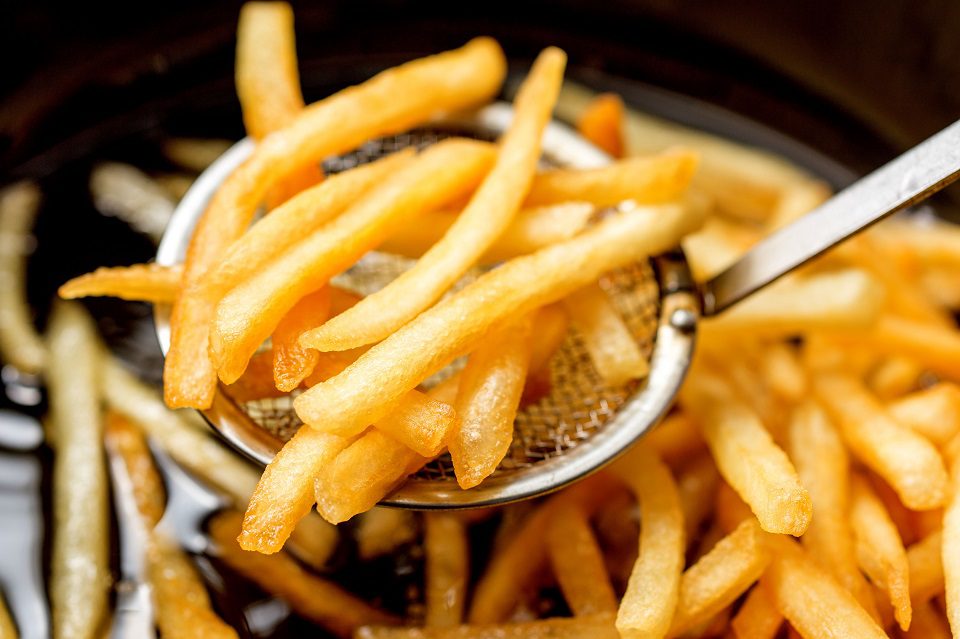Did you know these foods have a negative impact on your brain’s health?
We don’t need to tell you that following a healthy diet is essential for your overall health. But maybe you need to know that certain foods can harm your brain. While berries, dark chocolate, fatty fish, broccoli, and avocados are all brain-boosting superstars, the foods most people tend to eat on a regular basis can have negative consequences on their brain’s function.
Therefore, identifying and then eliminating these foods from your diet is crucial for good memory and thinking. In time, being a regular eater of these foods could bring about several diseases, including Alzheimer’s. Try to avoid the following foods as much as possible in order to keep your brain in tip-top shape.

Fried foods
Generally, fried foods are bad. Even healthy foods can become potentially dangerous when fried. So, it’s not always about the foods you eat, but how you choose to prep and consume them. Fried foods like fried chicken nuggets and French fries will affect your brain, too, not just your waistline.
According to several studies, people who tend to eat fried foods are more likely to “fail” cognitive tests. On the other side, the same studies pointed out that people who eat more plant-based foods could easily pass the tests. So, would you pass a cognitive test?
Kristin Kirkpatrick, RDN, in Denver, says that fried foods are usually associated with inflammation, leading to a reduction of brain tissue size. Now… have you ever heard of the MIND diet? If not, we are here to tell you that no fried foods are allowed on this diet. You will find foods like berries, whole grains, olive oil, and fatty fish.
Sugar-sweetened beverages
Yeah, they taste great, and that’s actually the main issue with them. To give them a taste boost, manufacturers opt for adding lots of sugar to their soft drinks. Sugar is probably the number one enemy of your brain, so try to avoid sugar-sweetened beverages like energy drinks, fruit juice, and sweet tea as much as possible. Ahh, and your morning cup of Joe should remain black.
If you need more reasons to quit sipping on sugar-sweetened beverages, the spokesperson for the Academy of Nutrition and Dietetics, Wesley Delbridge, RDN, could give you some. He said that consuming high amounts of sugar could lead to neurological damage.
In fact, a study backs that up, too. Researchers found that those who tend to drink sugar drinks more often than good ol’ fashioned water are more prone to develop poor memory and smaller hippocampus (the part of the brain responsible for learning) than people who stick to water consumption.
Refined carbs
Processed foods like white pasta, white rice, or white bread score high on the glycemic index, and make your blood sugar levels spike like it’s the fourth of July. And not only do these foods affect your blood sugar levels, but your brain as well. Nutritionists say that all refined carbs have negative consequences on your mental health.
A study published a couple of years ago in The American Journal of Clinical Nutrition found that most foods with a pretty high glycemic index (like the ones we mentioned earlier) can maximize the risk of depression in middle-aged women.
Replace your refined carb sources with complex carbs such as brown rice, barley, whole-wheat bread, quinoa, and farro. In general, complex carbs are beneficial for your brain health.

Tuna
It’s not about tuna itself, but the fact that it could contain high levels of mercury. Certain types of seafood like shark, tilefish, tuna, swordfish, marlin, and king mackerel could be contaminated with high levels of mercury. Studies suggest that people who have high levels of heavy metals like mercury in their bloodstream can have a 5 percent decrease in cognitive function.
However, it doesn’t mean that you should remove seafood from your diet for good. Kirkpatrick suggests eating potentially mercury-contaminated fish like tuna no more than once a week. Ahh, and bear in mind that the older the fish, the greater the chances of having high levels of mercury.
If you really want to make sure that you consume the best of the best, get your brain-friendly omega-3 fatty sources from wild salmon or lake trout.
Excess alcohol
Well, it’s not rocket science… Anyone could tell you that excess alcohol is bad for your brain health. A board-certified neurologist, David Perlmutter, MD, says that drinking in excess, no matter what you drink and how old you are, can lead to serious consequences on your brain function.
Sipping a glass of red wine once in a while is actually beneficial for your overall health, but if a glass of red wine transforms to three or four, Houston, we have a big problem. A study suggests that even one drink consumed daily can have certain effects on the brain. The most vulnerable part of the brain when drinking alcohol is the hippocampus.
If you want to take good care of your brain, limit your alcohol intake to no more than two alcoholic beverages per day (for men), or no more than one drink (for women). Moderation is key in everything!
Artificially sweetened beverages
What can be worst than sugar-sweetened beverages? Well… simple: artificially sweetened ones such as diet soda. Studies suggest that artificially sweetened beverages could increase your risk of developing dementia or having a stroke. The study involved people who drank diet soda every single day (just like our former president).
At the end of the study, researchers concluded that the participants of the study were three times more likely to have a stroke. And the real problem with most artificially sweetened drinks like diet soda is the fact that its sweet taste remains on the taste buds, making you crave even more cans. Kirkpatrick suggests kicking this bad habit immediately, adding that water could taste heavenly too if you add some berries to it.
Processed meats
No one denies their taste, but they are far from being beneficial. Unfortunately, people who eat processed meats on a regular basis have a greater risk of developing certain health conditions like dementia. In fact, processed meat consumption is often associated with an increased risk of developing cancer, too.
Highly-processed meats such as cured meats, sausages, and hot dogs do no good for your health. Nutritionists say that following a diet filled with poultry, seafood, veggies, and fruits could decrease your chances of developing dementia. So, instead of indulging in processed meats, fill your plate with green leafy vegetables.
Fast food
Surprise, surprise! Fast food is on the worst brain foods menu, too. But why? Well, mainly due to their high levels of saturated fats. Just name one fast food item that doesn’t contain saturated fats. Yeah… thought so, you can’t. And it’s not just their high content of saturated fats, but their sodium content, too.
Did you know that high levels of sodium can lead to brain fog when consumed? It sounds crazy, but it’s true. Health pros explain how it is possible: when we eat too many salty food items, we often experience high blood pressure. This restricts the blood from going to the brain. That’s why you can experience brain fog after consuming large amounts of sodium. Avoid fast food items as much as you can.
Likewise, you could try to look more into things like the Mediterranean diet. It is filling, quite simple to hold, and does wonders for your health. Read more about it in this book!

Too much red meat
When consumed in moderation, red meat is very nutritious, offering a good amount of protein, zinc, iron, B12, and creatine. However, studies suggest that way too much of it could lead to Alzheimer’s disease. In fact, it seems that people who eat red meat a lot have the highest Alzheimer’s rates.
But what’s causing this exactly? Well, diets high in red meat sources promote insulin resistance, a known risk factor for Alzheimer’s disease and dementia. High amounts of iron could lead to oxidative damage, too. And there’s also the cooking process. Red meat cooked at high temperatures can maximize the formation of advanced glycation end-products (AGEs).
Many studies have found that higher levels of AGEs in the brain could lead to oxidative stress and inflammation. Don’t eliminate red meat sources from your diet; just try to eat them in moderation. Ahh, and opt for grass-fed beef.
Foods high in sodium
Whenever you want to make something taste better, you add salt. This is available for 90 percent of Americans, who, according to the Centers for Disease Control and Prevention, consume way too much salt. So, 9 of 10 Americans of all ages have a thing for salt. The findings are not only alarming but, annually, excess salt intake causes up to 100,000 deaths in our country alone.
We could easily say that excess salt intake is like a silent pandemic in the U.S. In addition to all of that, foods high in sodium can also impact your brain health. A high-salt diet is often associated with a greater risk of Alzheimer’s disease and dementia.
A study even found that foods high in sodium can restrain the blood flow to the brain. Salad dressings, soy sauce, sandwiches, pork rinds, canned vegetables, pretzels, and cold cuts are only a few examples.
Takeaway
Our diet has a big impact on our brain health. Inflammatory diet patterns, in particular, are the worst for the brain. If you want to improve your brain functions, eat more organic fruits (especially berries) and vegetables, olive oil, wild-caught seafood, poultry, nuts, and seeds.
A diet that benefits your brain should also contain healthy fats such as avocados and coconut oil. No matter what brain foods you choose to consume, it’s essential to limit the consumption of foods that don’t benefit your brain at all.
However, you shouldn’t only be paying attention to your brain! Read more about the signs that could point to your heart needing a thorough check-up here!














One Response
Maybe the “experts” would be happy is we only ate nuts and berries I will eat what I want and it is nobody else’s business what I eat